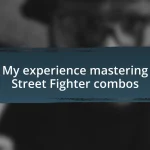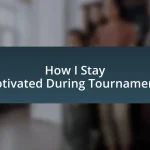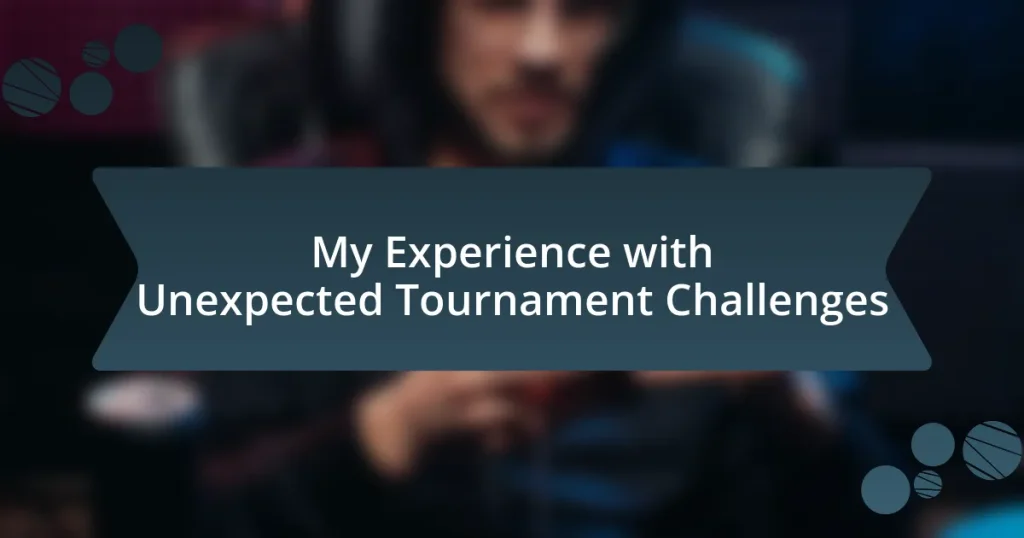Key takeaways:
- Adaptability is essential in tournaments, as unexpected challenges can disrupt even the best-laid plans.
- Building mental resilience through positive self-talk and flexibility enhances performance under pressure.
- Reflecting on past experiences helps identify weaknesses and improve strategies for future competitions.

Understanding Unexpected Tournament Challenges
When I think back to my own tournament experiences, unexpected challenges often felt like they came out of nowhere, much like a sudden storm when you’re not prepared for rain. It’s as if you’ve trained for a sunny day, only to find yourself in a downpour. Have you ever experienced a moment where everything seemed to shift dramatically?
In one memorable tournament, I faced an opponent whose strategies took me completely off guard. I had practiced against similar styles, but this player’s approach was unique and unpredictable. It was a humbling reminder that in any competitive environment, adaptability is essential. How do you prepare for something you can’t foresee, right?
In grappling with these surprising hurdles, I learned the importance of mental resilience. The ability to compose yourself when things don’t go according to plan can make all the difference between victory and defeat. Have you ever felt that rush of doubt creeping in? Trusting in your preparation and maintaining focus can transform a daunting challenge into a learning opportunity.
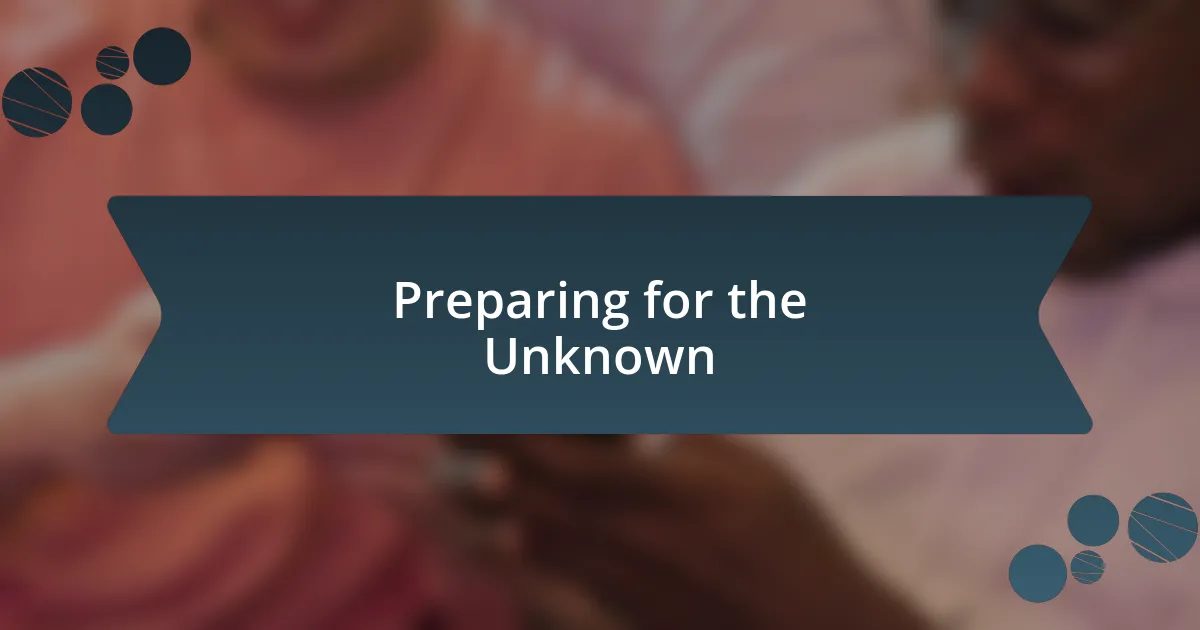
Preparing for the Unknown
Preparing for the unknown requires a shift in mindset. I recall a particular time when an unexpected rule change threw our entire strategy out the window during a tournament. We had rehearsed meticulously, anticipating every scenario, yet this twist caught us by surprise. It emphasized a vital point: flexibility is just as important as preparation itself.
One effective way I’ve found to prepare is by developing a toolkit of adaptable strategies. For example, I create multiple game plans that can easily morph based on the unfolding circumstances. Having several options helps mitigate anxiety when unfamiliar challenges arise. How many times have you wished you had a backup plan?
Lastly, I focus on cultivating a positive mindset. In moments of uncertainty, it’s easy to spiral into doubt. Staying calm and recalling previous experiences where I overcame challenges has been instrumental for me. This internal dialogue reinforces my belief that I can handle whatever comes my way, even if it’s something completely unanticipated.
| Preparation Techniques | Description |
|---|---|
| Flexible Mindset | Embracing change and being ready to adapt strategies quickly. |
| Toolkit of Strategies | Creating multiple plans to use in different scenarios. |
| Positive Self-Talk | Using affirming thoughts to build confidence during uncertainty. |
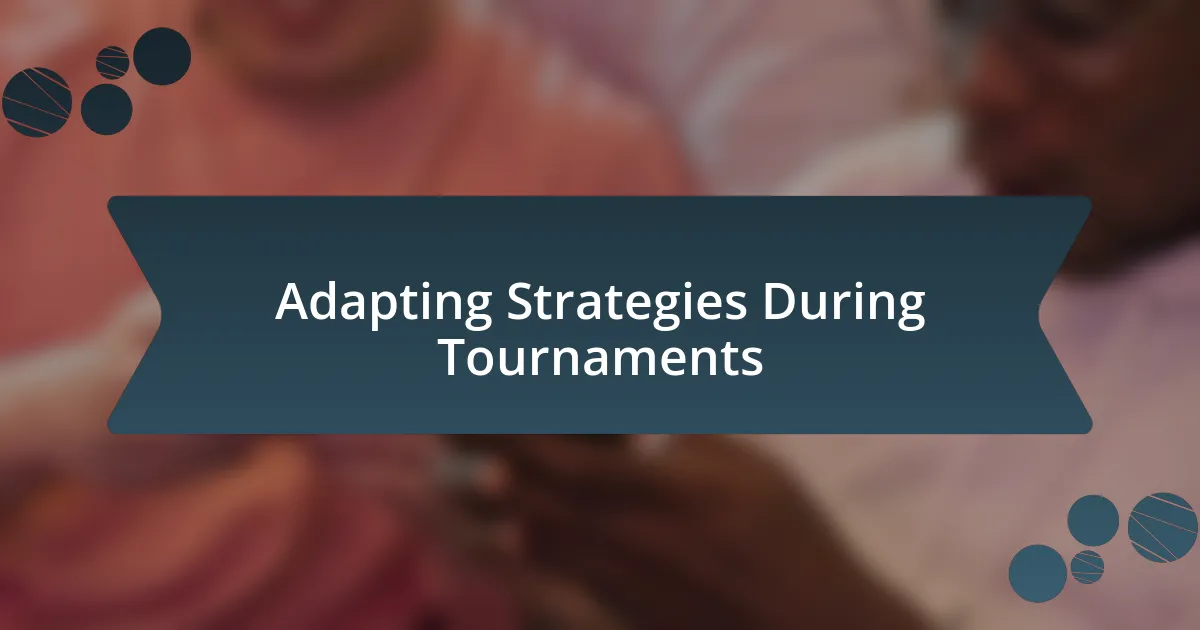
Adapting Strategies During Tournaments
Adapting strategies during tournaments is crucial, especially when faced with unexpected challenges. One memorable experience I had was when a surprise opponent unveiled an unconventional play style. Initially, my heart raced, but I quickly had to recalibrate our approach on the fly. This situation showcased the importance of not only recognizing our strengths but also adapting to exploit the weaknesses of our opponent—in the moment.
- Analyze Opponent Behavior: Watch and note any unexpected tactics they employ.
- Communicate with Team: Ensure everyone is on the same page about strategy adjustments.
- Stay Calm Under Pressure: Maintaining composure allows for clearer decision-making.
Whether it’s adjusting your approach or switching roles within the team, being agile can be the difference between victory and defeat. I remember standing on the sidelines, urging my teammates to trust their instincts and stay fluid in our strategy. That sense of unity fueled us, reminding me how adaptability isn’t just about individual skill but also about teamwork in adapting together.
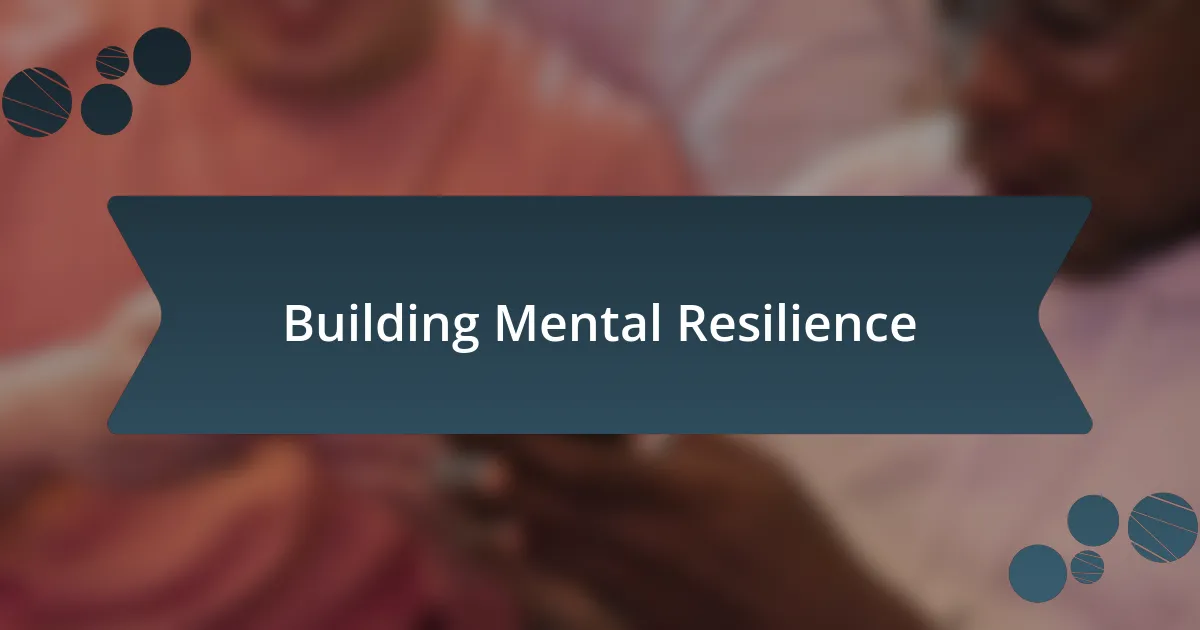
Building Mental Resilience
Building mental resilience during tournaments has been one of my greatest teachers. I recall a moment when a sudden rule change threw our preparations into disarray. Instead of succumbing to frustration, I focused on reminding myself that flexibility was key. By reframing my mindset to view the change as an opportunity for growth rather than an obstacle, I found my confidence in facing the unknown increased significantly.
In the heat of competition, maintaining a positive outlook can feel challenging, especially when the stakes are high. I once found myself down in a critical match, battling thoughts of self-doubt. I took a deep breath, reminded myself of my training and the countless hours of preparation, and allowed that belief to fuel me. This shift in perspective not only calmed my nerves but also spurred me on to fight for every point with renewed determination.
I’ve often wondered how some athletes seem to bounce back from setbacks with such grace. I think it boils down to a strong mental foundation built on past experiences and self-reflection. After every tournament, I take time to analyze my performance—what went well, what didn’t, and how I handled unexpected challenges. This practice has not only helped me improve my game but also strengthened my mental resilience, preparing me for whatever surprises may arise in the future.

Learning from Past Experiences
Reflecting on past tournaments, I’ve learned that every unexpected challenge teaches invaluable lessons. There was a match where my opponent employed a strategy I had never encountered before, and I found myself flustered. Looking back, I realized that this moment taught me the importance of adaptability and thinking on my feet—skills I’ve carried with me ever since. How often do we encounter situations that push us out of our comfort zone? Each time, if we embrace those moments, we can refine our approaches and strengthen our resolve.
The emotional rollercoaster of competition often leaves us questioning our abilities. I distinctly remember a tournament where a crucial mistake cost me a match. I felt defeated for days, but during that reflection period, I asked myself: What could I have done differently? This introspection helped me recognize my weaknesses, and instead of letting disappointment linger, it fueled my determination to improve. Isn’t it fascinating how setbacks can ultimately guide us toward becoming better versions of ourselves?
Over time, I’ve come to appreciate the value of documenting my experiences. After each tournament, I jot down insights—my thoughts, emotions, and outcomes. One tournament stood out where my game plan crumbled under pressure, yet I couldn’t help but smile when I reflected on my growth. It was in these moments of vulnerability that I discovered resilience. How much can we learn simply by taking a step back and evaluating our journeys? That practice of learning from past experiences continuously shapes my mindset, pushing me to embrace every unexpected twist with optimism.
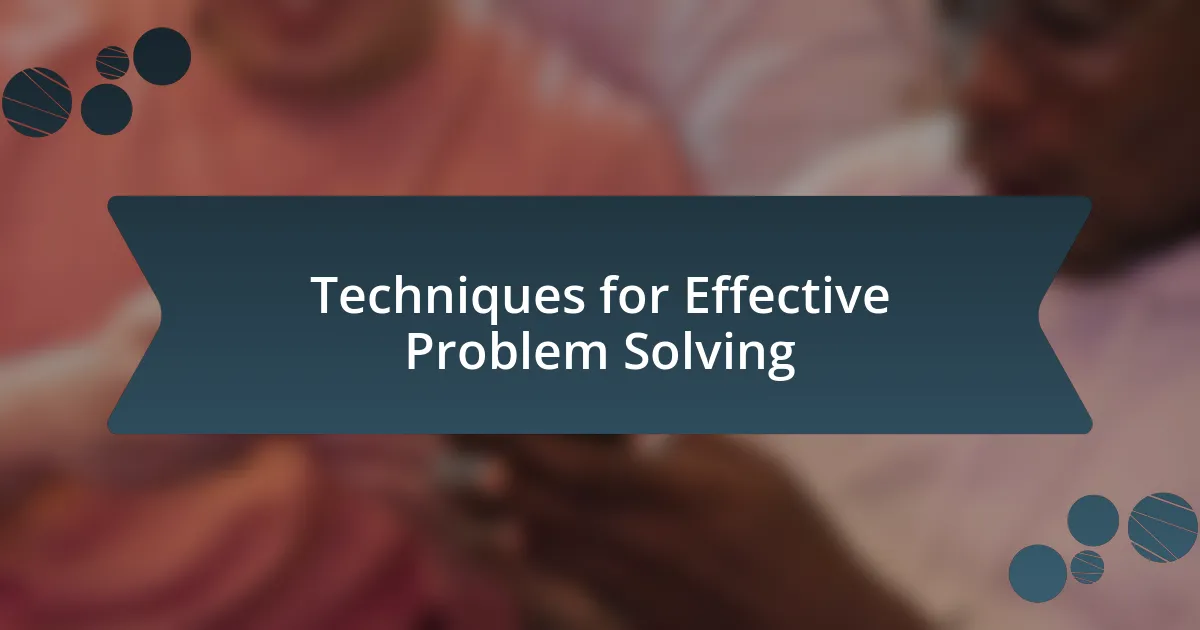
Techniques for Effective Problem Solving
One essential technique I’ve found invaluable in problem solving is breaking down challenges into smaller, manageable parts. I recall a particularly stressful tournament where my ambition led to an overwhelming sense of pressure. Instead of fixating on the end result—winning—I focused on each individual match and what I needed to improve for that specific encounter. This approach allowed me to tackle problems more systematically, ultimately leading to a stronger performance.
Another strategy involves maintaining a growth mindset. I’ve often been surprised at how a simple shift in perspective can change the course of my actions. During a match, I made a crucial mistake that put me on the back foot. Rather than dwell on it, I chose to view it as an opportunity to learn. I asked myself, “What can this teach me?” This moment transformed my fear of failure into a curiosity for growth, and the improvements I made afterward were remarkable.
Collaboration often enhances my problem-solving skills, too. I remember one instance where my teammates and I faced an unexpected strategy from our opponents. Instead of working in isolation, we gathered to brainstorm solutions together. Sharing diverse viewpoints not only fostered camaraderie but also led to innovative tactics I would have never considered alone. How often do we underestimate the power of collaboration when tackling problems? Trusting in others can often illuminate paths that we might overlook.

Sharing Your Own Tournament Stories
Sharing your own tournament stories can be a powerful way to connect with others who face similar challenges. I remember a time when I faced off against a much more experienced opponent in a high-stakes match. The atmosphere was electric, and my heart raced with both fear and excitement. As I walked onto that stage, I realized that every other competitor had their own battles to fight; we were all in this together, united by our shared experiences.
In another tournament, I experienced the invaluable lesson of adaptability. My team was executing a strategy we’d practiced extensively, but our first match revealed that our opponents had completely countered it. Instead of panicking, I took a moment to reflect. What could we change on the fly? In that moment of improvisation, I discovered the thrill of thinking on my feet, which became one of my proudest achievements, even if we didn’t end up winning.
Have you ever found yourself in a situation where everything was going wrong? That happened to me in a knockout round when I lost my first match unexpectedly. At first, I felt defeated, but I started to share my feelings with friends nearby. Their understanding and encouragement reminded me how important it is to have a support network. Vulnerability in these situations can spark some of the most meaningful connections, turning a tough experience into a story that inspires both myself and others.

